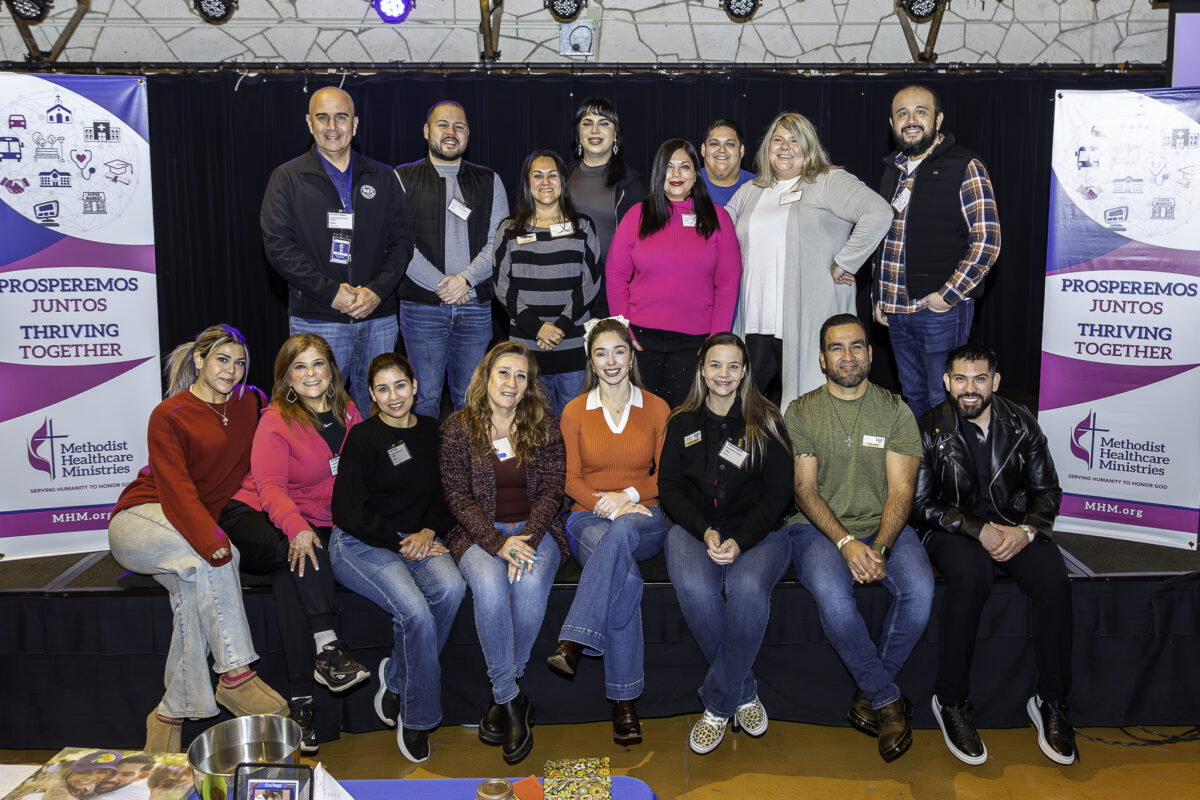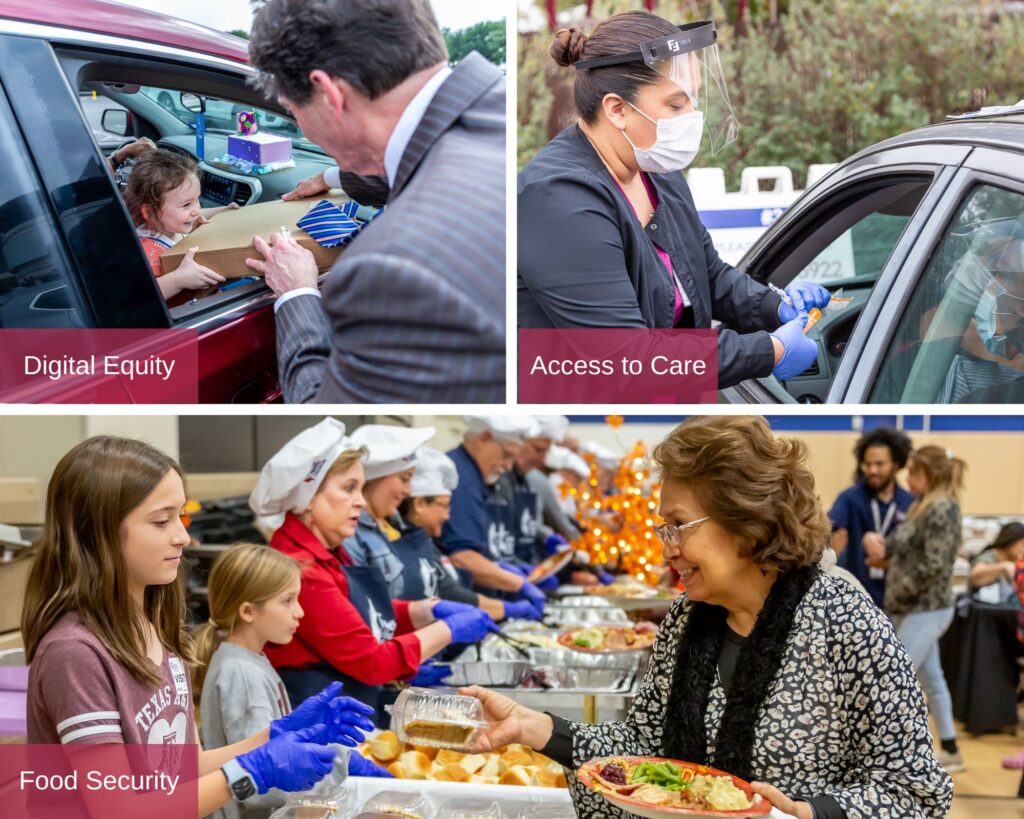Strengthening Communities: MHM’s Second Strategic Focus Area

Methodist Healthcare Ministries of South Texas, Inc. (MHM) is Strengthening Communities as part of its second strategic focus area. For nearly 30 years, the organization has been working to create access to care and working alongside communities across its 74-county service area. In its ongoing effort to advance health equity, MHM has shifted the way it collaborates with community members. MHM believes communities hold inherent strengths and the expertise to achieve their full potential for health and life. This focus area is a critical component of the organization’s central mission of Serving Humanity to Honor God. The following sections outline some of MHM’s work and collaborative efforts around Strengthening Communities.
MHM’s second strategic focus area expands on a continuum of care centered around two pillars: Thriving People and Thriving Places. This work is demonstrated through MHM’s upstream efforts which aim to improve community conditions before people get sick. These efforts include strengthening a health and well-being system, addressing the root causes of inequities, and partnering with individuals, families and communities. Community Health & Wellness programs are tailored to respond to distinct attributes through staff who partner with communities to address health care needs and co-create sustainable healthcare solutions that advance health equity. 1
Amplifying Voices and Empowering Change:
One way the organization is Strengthening Communities to address the root causes of health inequities is through its Communities of Solutions (CoS) program. Tim Barr is the Director of the COS department; he explains the significance of creating an open dialogue and presence, “Equity doesn’t happen by accident. It requires vision, planning, and courageous conversations. We talk openly about power. We are purposeful about accompanying groups on a journey from charity to equity to liberation. We are intentional about building relationships through sharing meals, attending community events, celebrating successes, and always trying to learn as much as we can about the community’s history.”

There are two facets to the COS department designed to shift power and address the root causes of health inequities: Community Connectors and Prosperemos Juntos | Thriving Together (PJTT). Community Connectors are added to are added to different geographic areas of strategic opportunity, which Barr describes, which Barr describes as a “systemic process.” He explains, “they build, maintain, and facilitate relationships and networks with a variety of groups. They also educate, advocate, and provide guidance to support upstream efforts.”
As relationships and networks are formed, a PJTT invitation is extended to communities. PJTT supports the development and growth of community-driven coalitions across south and central Texas. Persons with lived experience engage in a community change process, and coalitions form around common goals. “PJTT works with coalitions through specific frameworks to create and implement community-driven health equity strategies.” Barr emphasizes the importance of partnering with communities, “Our team accompanies coalitions in developing leadership and inclusive infrastructure so that community residents have a sense of ownership in their coalition’s efforts. Ownership requires intentional preparation and attention to the who, what, when, and how of decision-making.”
Building Upon Existing Strengths:

Other Community Health & Wellness programs span across MHM’s 74-county service area. The Wesley Nurse program is one of the organizations largest programs, geographically. There are over 80 Wesley Nurse sites, predominantly located within churches. Wesley Nurses support the community by offering free services that encourage a healthy lifestyle. They incorporate nursing with intentional care of the spirit and provide holistic services, including health education, health promotion, and access to resources.
Community Health Workers or Promotores de Salud serve a pivotal part of the organization’s ministry efforts. Utilizing their specialized knowledge of the communities they serve, Community Health Workers have the unique ability to reach vulnerable, low-income, and underserved individuals. They also act as a resource, and bridge access to community-based health programs and advocates.2
Another example of how MHM is Strengthening Communities is through its access to care services. In San Antonio, the Wesley Health & Wellness Center and Dixon Health & Wellness Center offer a range of affordable services to individuals who are uninsured, including medical, dental, and behavioral health. In Guadalupe County, the George Ricks School Based Health Center provides comprehensive services to children and their siblings enrolled in Schertz-Cibolo-Universal City Independent School District. This includes primary health care, behavioral health, and dental services.
Patient and Community Centered:
MHM utilizes a Patient Centered Medical Home (PCMH) model to provide high quality and affordable care centered around each patient. In 2023, the organization received the PCMH certification from the National Committee for Quality Assurance (NCQA). NCQA accredits and certifies health care organizations that have made a commitment to a patient-centered approach to care and continuous quality improvement. Jaime Wesolowski, President & CEO of Methodist Healthcare Ministries said of the milestone, “We recognize that patients come to us seeking relief not only from physical conditions but also healing from emotional and spiritual trauma. Using evidence-based practices, we listen carefully to each patient and offer integrated medical, behavioral, and oral health care that is coordinated alongside parenting and wellness classes so that each patient has the opportunity to thrive.”
Intentional Investment:

To strengthen and sustain healthy communities, MHM is a philanthropic partner to other organizations that address the Social Determinants of Health (SDoH). Using a trust-based approach to grantmaking, MHM grantees are encouraged to be creative in developing projects, programs and services that support Thriving People and Thriving Places within the service area. To further its health equity commitment, the organization has sharpened its focus in several cross-cutting areas: Access to Care: Mental & Behavioral Health and Access to Care: General, Digital Equity, Food Security, Housing, and Education & Workforce Development. In 2023, MHM’s Community Investments department reviewed philanthropic industry best practices, identified gaps in the organization’s service area, and examined how its grant support can be most impactful. After seeking and incorporating stakeholder feedback, the organization introduced innovative approaches to the 2025 grant cycle process.
MHM recognizes advancing health equity is a long-term commitment and requires collaborative efforts along the way. Its second strategic focus area underscores the importance of partnering with communities so they may achieve their full potential of health and life. This belief is imperative to the organization’s strategic work across a variety of levels. Equipping groups with support and resources amplifies their expertise and strengths to illicit change. MHM is proud to work alongside communities across its region as it deepens its work to advance health equity for years to come.
